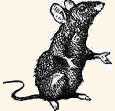When I lived in Austin years ago, there was one summer that I took it into my head (the same way, I guess, that you'd decide to just intentionally shoot yourself in the foot) to live about half an hour out in the country.
It was a town called Matchbox, no doubt a pleasant place in some regards, though I can't claim that I ever saw much of it. I generally drove straight "home" from Austin and straight out again the next day. Despite the cheapness of the rent, my heart and soul and work were still in Austin, not out here with the cows that wandered the place with their incredibly snotty noses and endless slobbering.
They'd never shown me that about cows on TV. Of course, they'd never shown me a horse's penis, either. I don't guess I needed to see one, but how does someone hide a thing like that, anyway? In the days of nicey-nice, though, TV could do it. I was a very thorough city denizen, not a country boy at all. I had made a mistake in coming to Matchbox, a thing which the town would be pleased to assure me of again and again.
Adding to my general sense of unease about it all was that my hair was rather long and everyone I did encounter in Matchbox seemed to be whistling that country tune by Merle Haggard. You know, the one where he brags about how his people from Muscogee are so smart that they don't smoke no marrywanny or commit unpatriotic acts or have sex with the barn animals. I hadn't seen nearly as much of all that as bumpkin Merle seemed to imagine that he'd seen, so I just tuned him out when I could and anybody else who seemed to know the same tune.
Unfortunately, though he was a fine fellow, I shared the house with a fellow named Gayle, a candlemaker whose long frizzy red hair and tall skinny frame made him far more of an attention getter than I was. He was not inconspicuous. He was almost goofily good-humored, which I suppose made most people assume that he was stoned all the time. It wasn't true, though--he was just stoned Most of the time. But he handled it better than I could, so I didn't worry too much about that, either. I used to see him dip his fingers in the hot wax sometimes "just to check the tempeature" and wondered if he had good sense. I later realized that the familiarity of working with it for several years had simply made him less jumpy about the heat than I was. He had a tolerance for it, but he hadn't lost sensation in his fingers. He made a wide variety of candles, most of them of quite high quality, some of them very innovative, utilizing crushed ice and antiquing stains. Of course, he probably didn't invent it all, I wasn't a world traveller. But he had pulled together some good designs and was good at what he did, and I always find that agreeable.
Every once in a while during the time we were there--a couple of months, as I recall-odd things would happen. Human things, though they'd give you the creeps. A tiny touch of Twilight Zone. Peculiar objects would appear on the front gate and fence posts at the cattle guard where we entered the property. Old tee-shirts, torn and smeared with who-knows-what. Tin cans and jar lids strung on bits of string. Sometimes smashed watermelons were found stuck on the poles like disembodied heads from some comical war that we didn't know about. At one point a gigantic wooden sign appeared on our gate as if we'd been invaded and taken over by Greenbriar, a local hippie commune and private school. Gayle knew a couple of people who lived there, so we got word to them and the guys from Greenbriar came and got the sign which had been stolen from them. They were very good-humored and fairly unconcerned about it. But they were a larger group than just the two of us, I thought. It was then that I began to get the willies and to just want to leave. Nonetheless, I hated to make a change and I hung on, lasting long enough for another odd, somewhat more comic adventure that summer. THEN I got the hell out of Dodge!
Come back tomorrow for Part Two of this Summer Saga!
THOUGHT FOR THE DAY: "They wrote in the old days that it is sweet and fitting to die for one's country. But in modern war there is nothing sweet or fitting in your dying. You will die like a dog for no good reason." -- Ernest Hemingway












No comments:
Post a Comment
Abandon hope, all ye who enter here! (At least put on your socks and pants.)